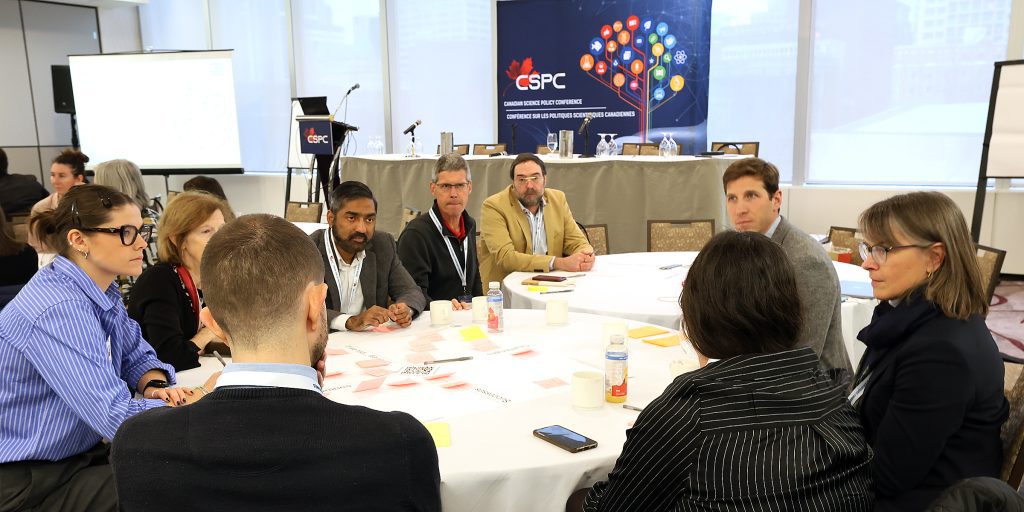(Last updated – October 2023)
Fundamental research funding in Canada is viewed in a positive light by Canadians, who understand its importance for their health and well-being, and by the current government. However, despite the re-investments in the Canadian funding agencies announced in 2018, research funding in Canada remains low when compared to that of other countries.
CIHR statistics
Compiled by the Canadian Association for Neuroscience from data available on the CIHR website.
Project grants granted by the Canadian Institutes of Health Research are the core funding mechanism for biomedical research in Canada. Unfortunately, success rates in recent competition have been dwindling (Figure 1). The success rates for funding applications at CIHR has steadily declined since 2005, from a 31% success rate to a success rate below 15% in 2018 (less than one in six successful applications). Current success rate levels are too low to maintain a diverse and flourishing research environment, as many excellent research programs go unfunded due to lack of available funds. Success rates under 20% means that researchers spend countless hours writing grant applications, while their chance of being successful are too low to be sustainable. In addition, it should be noted that the current funding level is only achieved by making drastic cuts to the budgets of all project grants (often >25%), which further highlights the lack of sufficient funding for this competition.
CIHR Grant application success rates 2000-2021
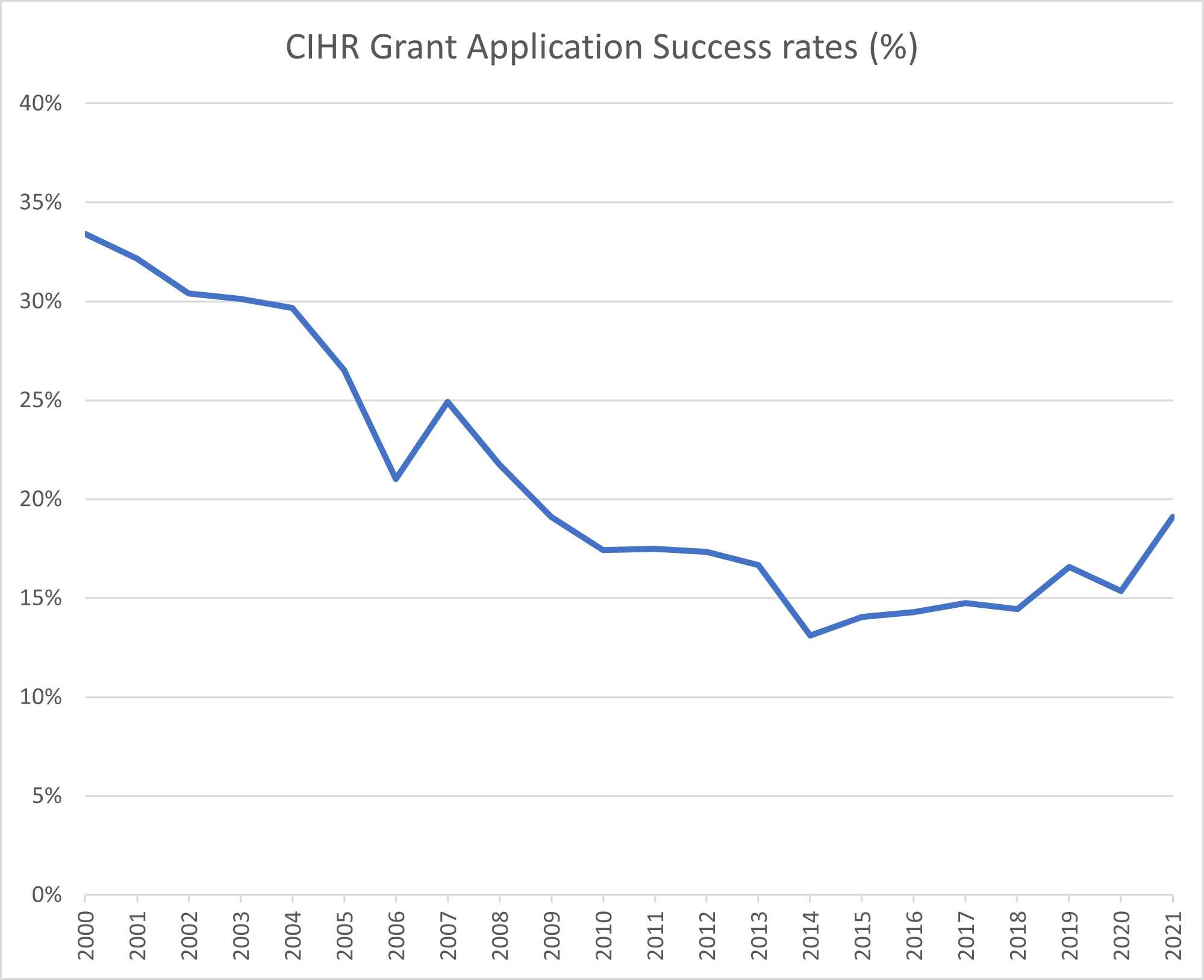
Data source available here (xls format)
CIHR budget 2000-2023
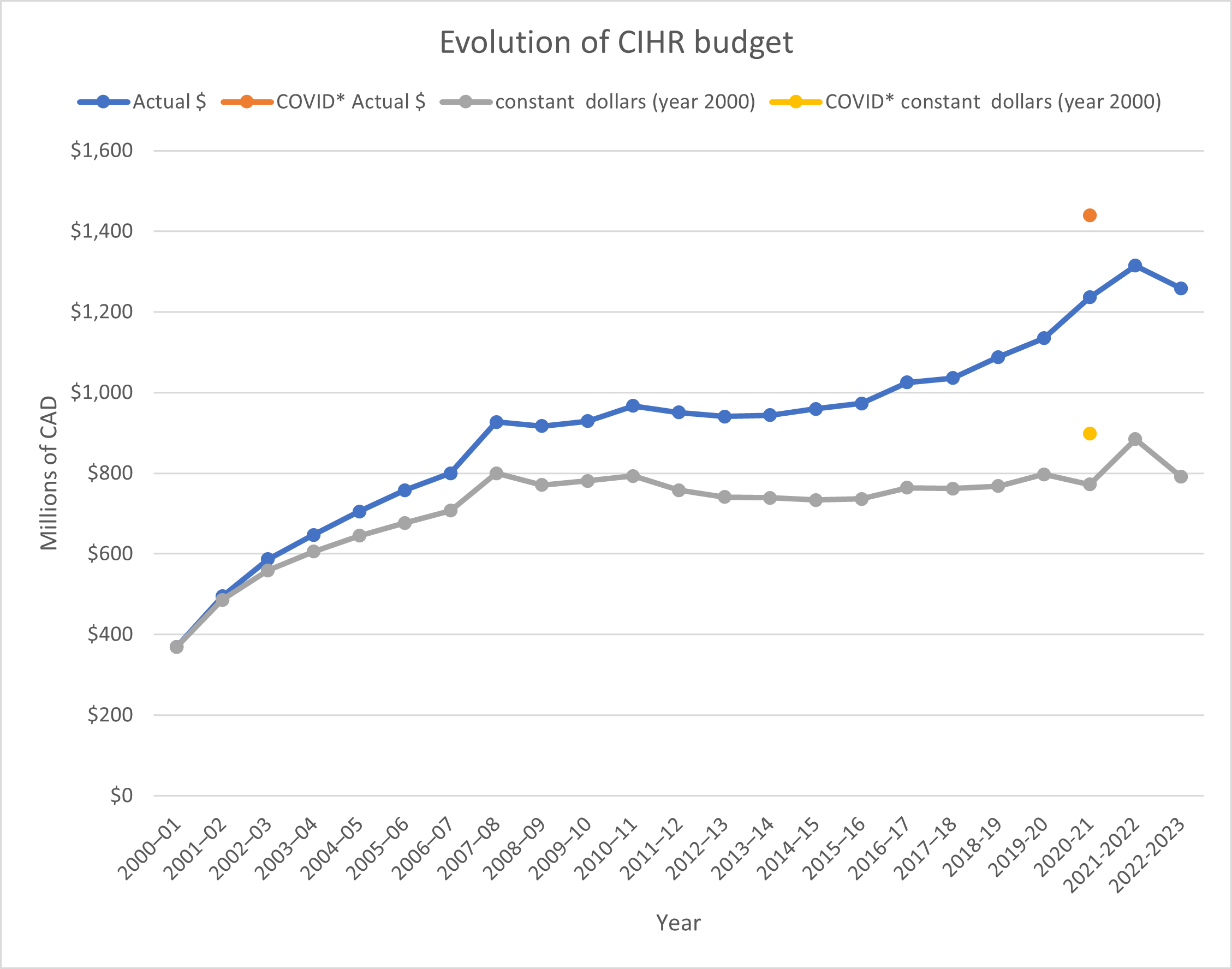
Note:
Year 2020-2021 included Statutory Authorities $203.6M time-limited funding for COVID-19 research (Pursuant to the Public Health Events of National Concern Payments Act). As this funding is a one-time addition to the CIHR budget not dedicated to the regular programs, it is indicated as extra data points (in yellow and orange in the graph)
https://can-acn.org/docs/cihr_nserc_statistics_2000-2023.xlsx
Comparison with the NIH budget
The NIH’s 2020-2021 budget was $41.5 billion USD (approx. $55.7 billion CAD), compared to CIHR’s $1.44 billion CAD (which includes one-time investments in COVID-19 research). This represents a 39-fold difference in funding support for CIHR, which contrasts with the nine-fold difference in population between the United States and Canada.
NSERC Statistics
NSERC budget 2007-2023
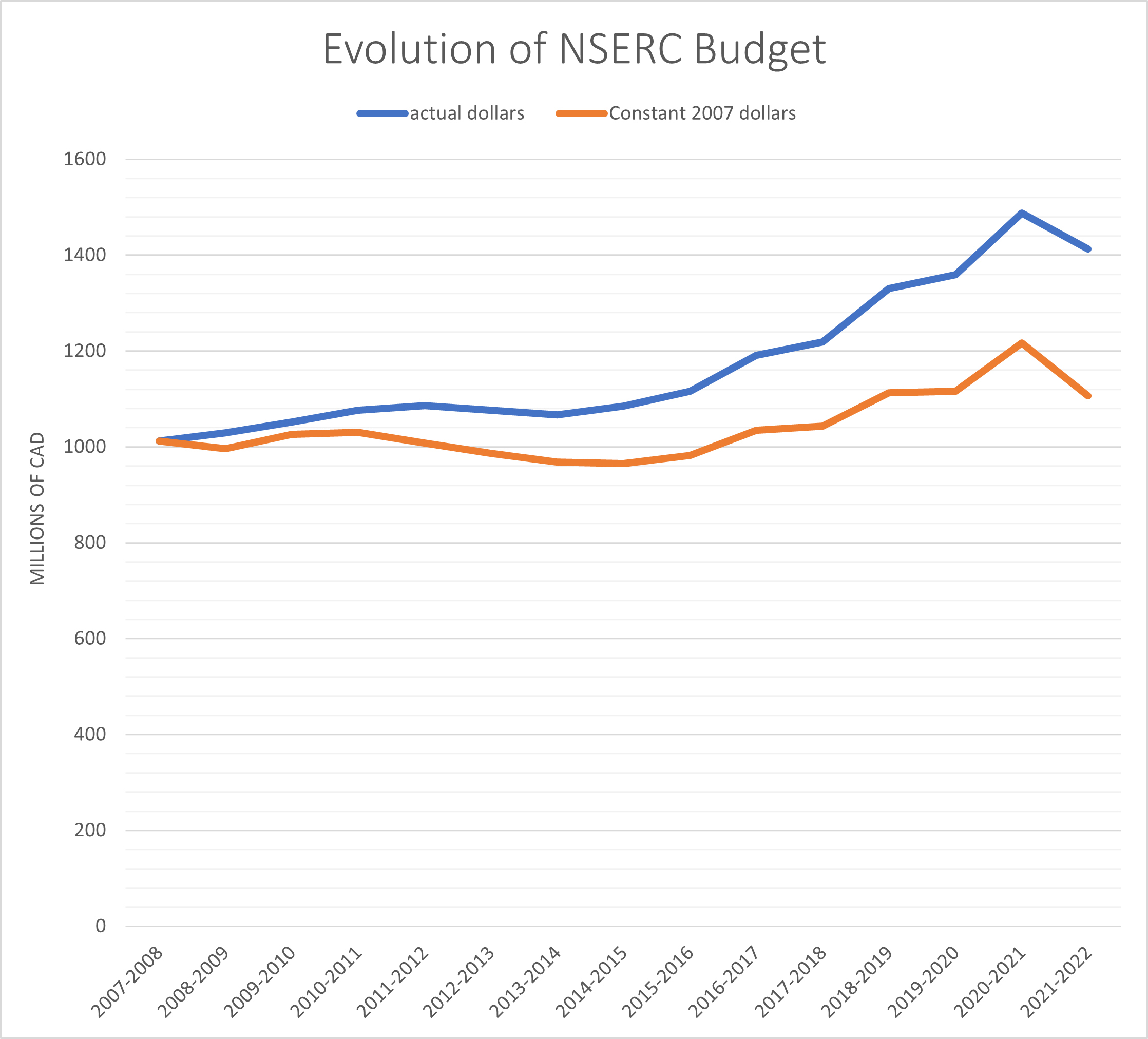
Data source available here (xls format)
SSHRC statistics
SSHRC budget 2006-2021
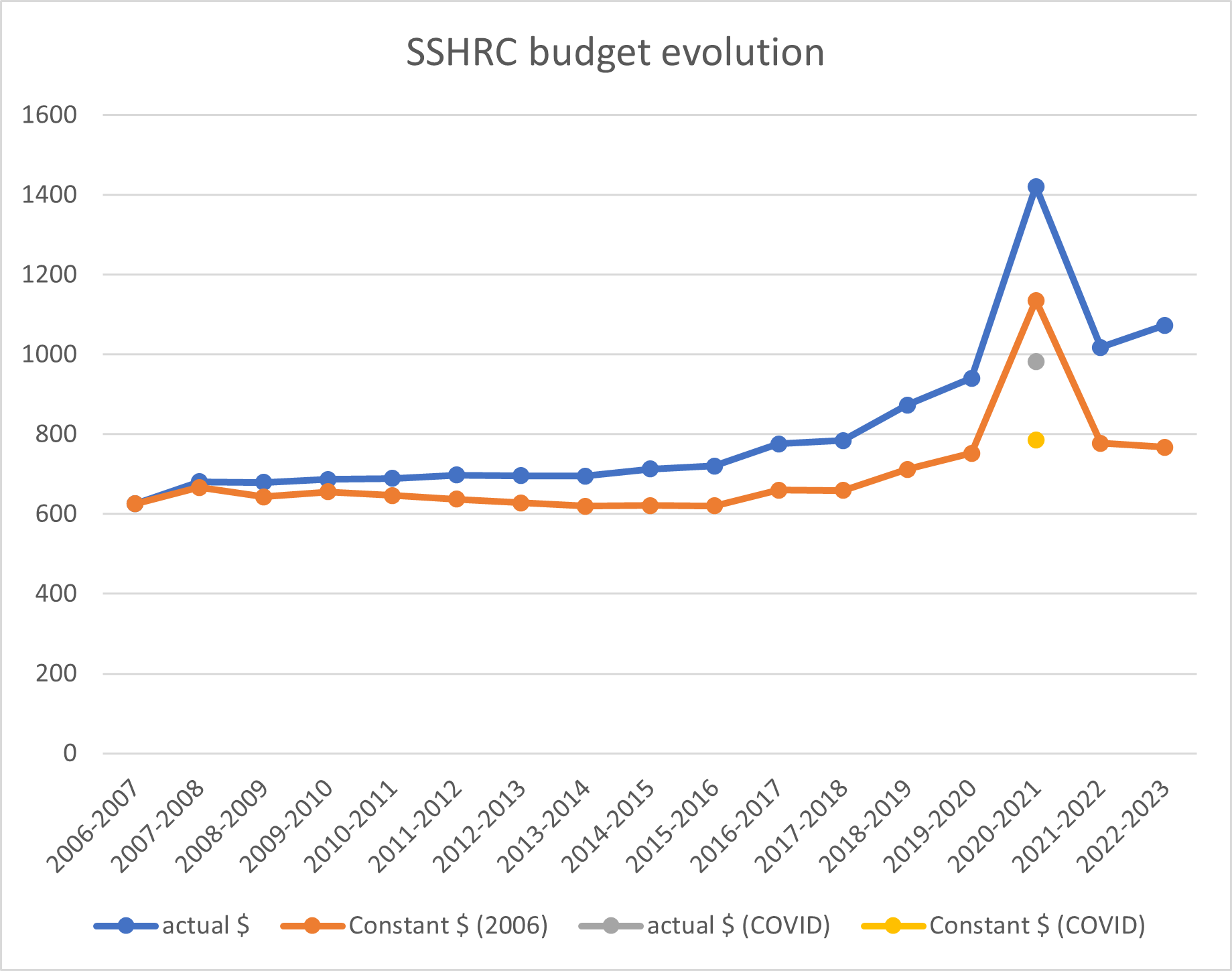
Data source available here (xls format)
Note:
Data points 2006 to 2019-2020 are actual spending, as reported in the SSHRC annual reports.
Four data points are reported for 2020-21 – the bottom two represent planned spending, while the upper two data points represent actual spending, and includes significant time-limited funding for COVID-19 research (Pursuant to the Public Health Events of National Concern Payments Act)
Student stipends
More support is required to maintain Canada’s attractiveness for the next generation of researchers. Trainees that successfully compete for Canada Graduate Scholarships (Master’s program; CGS-M), receive an $17.5K CAD per year award, an amount that has not kept up with inflation and is stagnant since 2003. This is below the low-income level cut-off of $22k CAD for a person living alone in a major Canadian city. The NSERC website states that “This support allows these scholars to fully concentrate on their studies in their chosen fields”. This is no longer accurate, and disheartening for students, who must now face rising housing costs and inflation rates. Academia is viewed as an uphill battle, with no clear indication that the situation will improve, which is a daunting prospect for trainees.
Paying students a living wage is the base for equity, diversity and inclusion, and absolutely required if we are to attract the brightest minds from diverse backgrounds and not only those who are independently wealthy.
Update – August 2022: the Support our Science Campaign website: https://www.supportourscience.ca/ presents more data on funding of trainees by NSERC.
The Fundamental Science Review Report (2017)
The Advisory Panel on Federal Support for Fundamental Science was appointed in June 2016. Their mandate entailed a review of the federal system of supports for research conducted by scientists and scholars employed outside of federal, provincial, or territorial government departments and agencies. The Fundamental Science Review, also known as the Naylor Report, made important recommendations to improve the Canadian Research Ecosystem.
The Panel’s single most important recommendation (R6.1) is that the federal government should rapidly increase its investment in independent investigator-led research to redress the imbalance caused by differential investments favouring priority-driven targeted research over the past decade. (Investing in Canada’s future – Strengthening the Foundations of Canadian Research: Canada’s fundamental Science Review, page xviii http://www.sciencereview.ca/eic/site/059.nsf/vwapj/ScienceReview_April2017-rv.pdf/$file/ScienceReview_April2017-rv.pdf)
In response to the publication of the Fundamental Science Review, the Federal budget of 2018 announced a historic investment in science. However, examination of the recommendations of the Naylor report and the investments announced in 2018 shows that full implementation of the recommendations of the Naylor report has not been achieved.
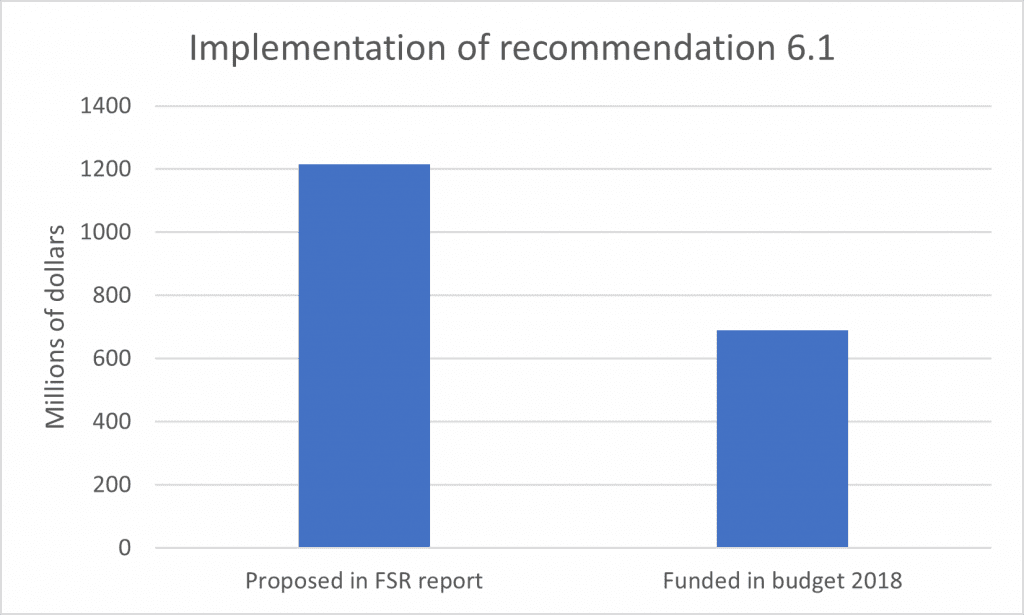
The Fundamental science review report proposed investments in Investigator-led direct project funding over 4 years of $1215 Millions, while $689 Millions were included in the same four year period in budget 2018, or 56.7%.
Source: Report of the Fundamental Science Review, p. 154
http://www.sciencereview.ca/eic/site/059.nsf/vwapj/ScienceReview_April2017-rv.pdf/$file/ScienceReview_April2017-rv.pdf
and Budget 2018 Chapter 2 p. 122—Progress millions of dollars – Investing in Canadian Scientists and Researchers: Granting Councils (https://www.budget.gc.ca/2018/docs/plan/toc-tdm-en.html)
Data from the World Bank
OECD Statistics
The Organisation for Economic Co-operation and Development (OECD) is an international organisation that works to build better policies for better lives. The OECD collects data and publishes statistics on a wide range of range of social, economic and environmental challenges.
Here we present a collection of graphics on science performance, science funding and the number of researchers in Canada. Canada is compared to the other countries.
Gross domestic spending on Research and Development
The following figure shows that Canada is the only country in the G7 in which Gross domestic spending on R&D has been going down over the last 20 years.
Canada is now second to last in the G7 in this metric.
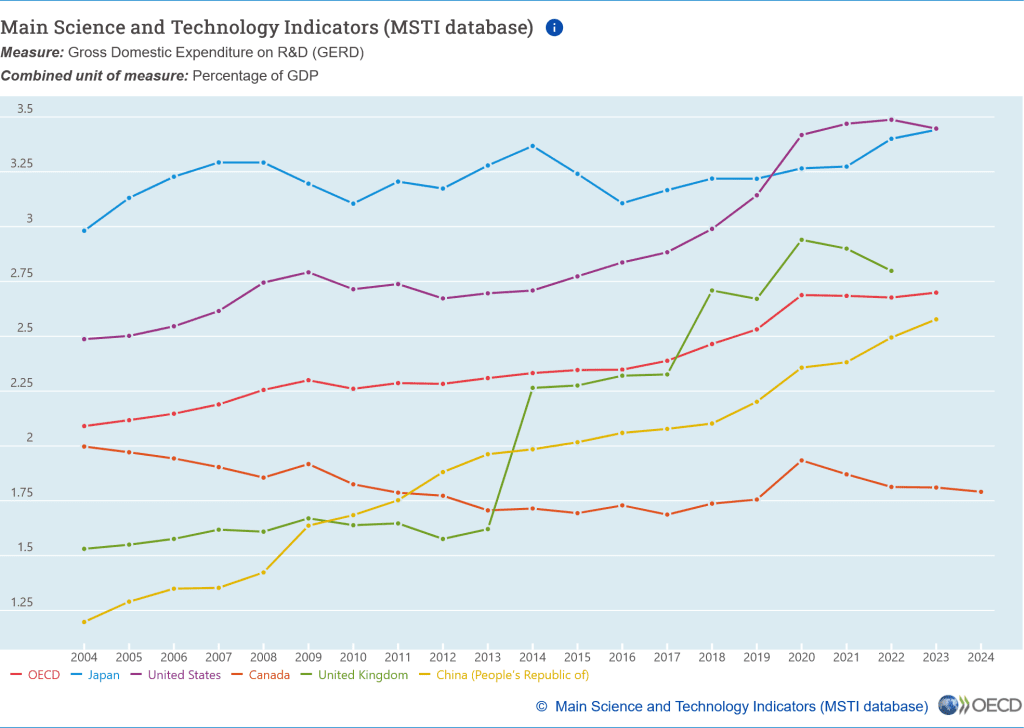
Direct link: https://data-viewer.oecd.org/?chartId=82ac7b91-4dc5-4518-8fd1-26b87ebfdd9b
Researchers
The following figure shows that the number of researchers per 1000 employed as compared to the average number for OECD countries
Direct link: https://data.oecd.org/chart/6OYK
Youth science performance
Canada’s youth hits high scores in science – Scientific performance, for PISA, measures the scientific literacy of a 15 year-old in the use of scientific knowledge to identify questions, acquire new knowledge, explain scientific phenomena, and draw evidence-based conclusions about science-related issues. The mean score is the measure.
Both boys and girls score high in this measure in Canada.
Direct link: https://data.oecd.org/chart/6OYR
Research-driven innovation is one of the pillars of today’s knowledge-based economy. The Canadian Association for Neuroscience is committed to advocating for increases in the total budget of the three main granting councils of Canada, CIHR, NSERC and SSHRC.







